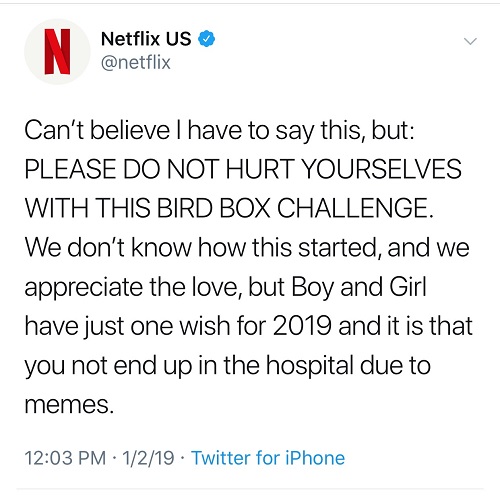T/TAS News and Updates
YouTube Bans Videos That Threaten Physical & Emotional Injury
- T/TAS at WKU
- Wednesday, January 23rd, 2019

In the wake of a number of unsafe and sometimes life-threatening pranks and challenges on social media sites, from eating Tide Pods, swallowing a mouthful of ground cinnamon, and dousing clothing in flammable chemicals then lighting themselves on fire, to the recent Bird Box, YouTube announces that it will ban the upload of such harmful and dangerous videos to its platform. YouTube is the largest online video provider across all age groups, with 326 million active users worldwide.
For example, in the Tide Pod Challenge social media users eat detergent packets on camera. The recent Bird Box Challenge has participants perform everyday activities blindfolded--which might include exercising, crossing a street or even driving a car. CNN online reports the prank is inspired by the Netflix movie "Bird Box," and even Netflix has warned viewers against attempting the Bird Box challenge this month. The video streaming service Tweeted on January 2, 2019:
"Can't believe I have to say this, but: PLEASE DO NOT HURT YOURSELVES WITH THIS BIRD BOX CHALLENGE. We don't know how this started, and we appreciate the love, but Boy and Girl have just one wish for 2019 and it is that you not end up in the hospital due to memes."
In efforts to better safeguard children, YouTube is also banning "pranks that cause children to experience severe emotional distress, meaning something so bad that it could leave the child traumatized for life," according to a recent Huffington Post article. Per YouTube’s Help site, the company has “worked directly with child psychologists to develop guidelines around the types of pranks that cross this line.” The site lists examples of the fake death of a parent, or severe abandonment, or shaming for mistakes.
What does your Head Start/Early Head Start program do in terms of parent education, child safety, and social media? As leaders in early childhood education, T/TAS encourages you to share this information to advance knowledge within your early learning community.
________________________________________________________________________
Paula Mydlenski, MS, RDN, LDN, CDN, a Specialist with T/TAS, Western Kentucky University, is the corresponding author of this article.
800.882.7482
www.ttas.org
ttas.info@wku.edu
Connect with T/TAS on Facebook and Twitter
Some of the links on this page may require additional software to view.
